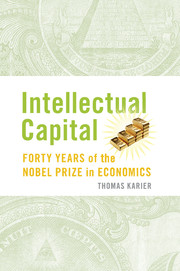Book contents
- Frontmatter
- Contents
- Preface
- Economic Nobel Laureates
- 1 An Economic Prize
- 2 Free-Market Economics
- 3 Micro: The Chicago School
- 4 Stock Market Casino
- 5 More Micro
- 6 Behaviorists
- 7 Keynesians
- 8 Classical Revival
- 9 Inventors
- 10 Game Geeks
- 11 General Equilibrium
- 12 A World View
- 13 Numbers Guys
- 14 History and Institutions
- 15 Reshaping the Prize
- Notes
- Index
15 - Reshaping the Prize
Published online by Cambridge University Press: 10 November 2010
- Frontmatter
- Contents
- Preface
- Economic Nobel Laureates
- 1 An Economic Prize
- 2 Free-Market Economics
- 3 Micro: The Chicago School
- 4 Stock Market Casino
- 5 More Micro
- 6 Behaviorists
- 7 Keynesians
- 8 Classical Revival
- 9 Inventors
- 10 Game Geeks
- 11 General Equilibrium
- 12 A World View
- 13 Numbers Guys
- 14 History and Institutions
- 15 Reshaping the Prize
- Notes
- Index
Summary
After completing its fortieth year, what can we say about the success of the Nobel Prize in economics? Has it fulfilled its mission of honoring those economists who, during the previous year, have rendered the greatest service to mankind? Have Nobel Prize–winning economists – the financial economists, the libertarians, the micro minds, the behaviorists, the Keynesians, the Chicago School, the inventors, the statisticians, the historians, and all the others – made this world a better place?
Some Nobel Prize winners invented planning tools that have certainly enriched our lives. With national income accounts we have a much clearer understanding about how well the economy is performing at any given time, and with input-output models and linear programming we can answer interesting and important questions. In other cases, Nobel Prize winners have proposed ideas that reinforce and sometimes challenge our understanding of economics. Right or wrong, these ideas force us to think about important social issues. But do we agree with Gary Becker that criminals are rational human beings who methodically calculate the costs and benefits of crime? Is James Buchanan correct when he claims that government officials are unlikely to act in the public interest? And what about Daniel Kahneman: Are human beings easily misled by context when making decisions? Are these ideas consistent with our own experiences and what we observe around us? Are they right most of the time or just some of the time?
- Type
- Chapter
- Information
- Intellectual CapitalForty Years of the Nobel Prize in Economics, pp. 300 - 306Publisher: Cambridge University PressPrint publication year: 2010

